Master's Degree in Neuropsychology

Curriculum designed with the most up-to-date tools in terms of neuropsychological assessment
In the era of Neurosciences, Neuropsychology was born to join in the goal shared with other scientific disciplines to understand the human brain, focusing its efforts on behavioral manifestations and higher processes associated with its normal and altered functioning. These alterations may be due to sudden brain damage, the appearance of a neurodegenerative disease or neurodevelopmental disorders. The work of the Neuropsychologist, the specialist in evaluating, reporting and rehabilitating impaired cognitive functions, is essential.
The general objective of this Master's Degree is to comprehensively train students in Neuropsychology, developing a professional profile capable of evaluating the cognitive deficits associated with different neuropsychological disorders and offering intervention and neurorehabilitation tools for any neuropsychological alteration in clinical practice.
Thanks to this master's degree, you will learn to:
- Identify normal and altered behavior due to acquired brain damage, neurodegenerative disease, or neurodevelopmental disorders.
- Perform a neuropsychological evaluation and prepare a report.
- Select and design effective neuropsychological intervention proposals.
Discover the programs and activities of the School of Life Sciences
Student profile: Those interested in studying and obtaining the Master's Degree in Neuropsychology, in addition to meeting the requirements imposed by current legislation, must have a degree in the field of behavioral sciences and psychology.
Official Degree:Master's Degree in Neuropsychology
earning Center::School of Life and Nature Sciences
Branch of knowledge: Health Sciences
Places offered: 95 (45 classroom attendance - 50 Online)
Total Credits 60 credits.
Minimum 12 ECTS credits and maximum 60 ECTS credits per enrollment and academic year.
Academic year it was introduced: 2023/2024
Duration: 1 year.
Teaching Type: Classroom attendance
Academic Regulations: General student’s regulations. Credit transfer and recognition. Regulation of student participation. Common procedures for carrying out the Final Research Project
University Services: [+info]
Internal Quality Assurance System System managers Incidents, Suggestions and Complaints Job placement report and assessment of training received Degree memory
Specialize in Neuropsychology at our Campus in the center of Madrid
Curriculum
The student must take 60 credits
First Semester 30 ECTS
Second Semester 30 ECTS
- 6 ECTS | Methods and techniques of neuropsychological intervention and rehabilitation
- 4 ECTS | Neuropsychology of dementias and disorders associated with aging
- 4 ECTS | Child neuropsychology and neurodevelopmental disorders
- 4 ECTS | Research methods in Neuropsychology and Neurosciences
- 6 ECTS | External Academic Internships
- 6 ECTS | Final Research Project
More information of the subjects
Profesores
| Profesores Professors | Porcentaje de Doctores Percentage of PhD holders |
| 19 | 95% |
 Jennifer A. Rieker
Directora del Máster en Neuropsicología
Jennifer A. Rieker
Directora del Máster en NeuropsicologíaProfesora de Neuropsicología de las Demencias y Trastornos Asociados al Envejecimiento, y de Métodos de Investigación en Neuropsicología y Neurociencias Director of the Master in Neuropsychology
Professor of Neuropsychology of Dementia and Disorders Associated with Aging, and of Research Methods in Neuropsychology and Neurosciences
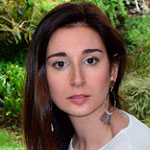 Natalia Arias del Castillo
Profesora de Trabajo de Fin de Máster
Professor of Final Master's Project
Licenciada en Biología, graduada en Psicología, Máster en Neurociencias, Doctora en Psicología, e Investigadora Principal del grupo de investigación Brain & Behaviour de la Facultad de Ciencias de la Vida y de la Naturaleza. Su experiencia docente abarca diversos sistemas universitarios, especializada en el seguimiento y maximización de los resultados de los alumnos en entornos universitarios. A nivel de investigación, se interesa por el estudio de tratamientos no invasivos en estadios tempranos de la neurodegeneración, así como en la búsqueda de biomarcadores en dichas enfermedades. Su inquietud abarca desde los ensayos preclínicos hasta la traslación a humanos, lo cual se refleja en las numerosas colaboraciones con universidades nacionales y extranjeras y con empresas. Cuenta con más de 50 artículos publicados en revistas de alto impacto (índice H = 14; Scopus) y sus trabajos han sido divulgados en numerosos congresos nacionales e internacionales.
Natalia Arias del Castillo
Profesora de Trabajo de Fin de Máster
Professor of Final Master's Project
Licenciada en Biología, graduada en Psicología, Máster en Neurociencias, Doctora en Psicología, e Investigadora Principal del grupo de investigación Brain & Behaviour de la Facultad de Ciencias de la Vida y de la Naturaleza. Su experiencia docente abarca diversos sistemas universitarios, especializada en el seguimiento y maximización de los resultados de los alumnos en entornos universitarios. A nivel de investigación, se interesa por el estudio de tratamientos no invasivos en estadios tempranos de la neurodegeneración, así como en la búsqueda de biomarcadores en dichas enfermedades. Su inquietud abarca desde los ensayos preclínicos hasta la traslación a humanos, lo cual se refleja en las numerosas colaboraciones con universidades nacionales y extranjeras y con empresas. Cuenta con más de 50 artículos publicados en revistas de alto impacto (índice H = 14; Scopus) y sus trabajos han sido divulgados en numerosos congresos nacionales e internacionales.
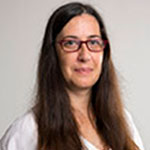 Ana Isabel Beltrán Velasco
Profesora de Trabajo de Fin de Máster
Professor of Final Master's Project
Graduada en Psicología Clínica, máster en Neuropsicología Clínica, doctora en Psicofisiología Aplicada, especializada en el estudio de estrés en alumnos de todos los niveles educativos y su impacto en el rendimiento académico. Asimismo, colabora como revisora certificada en revistas JCR y editora en Physiology & Behavior. Cuenta con una amplia experiencia en tareas docentes y de investigación, habiendo publicado diversos papers en revistas de alto impacto, indexadas en JCR.
Ana Isabel Beltrán Velasco
Profesora de Trabajo de Fin de Máster
Professor of Final Master's Project
Graduada en Psicología Clínica, máster en Neuropsicología Clínica, doctora en Psicofisiología Aplicada, especializada en el estudio de estrés en alumnos de todos los niveles educativos y su impacto en el rendimiento académico. Asimismo, colabora como revisora certificada en revistas JCR y editora en Physiology & Behavior. Cuenta con una amplia experiencia en tareas docentes y de investigación, habiendo publicado diversos papers en revistas de alto impacto, indexadas en JCR.
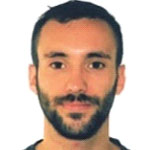 Francisco Buades Sitjar
Profesor de Métodos de Investigación en Neuropsicología y Neurociencias
Professor of Research Methods in Neuropsychology and Neurosciences
Doctor en Educación y Procesos Cognitivos por la Universidad Nebrija, Máster en Neurociencias por la Universidad de Barcelona, y Grado en Psicología por la Universidad de Valencia. Su investigación abarca el estudio de la percepción visual, verbal y auditiva, centrándose en el efecto que tiene la valencia afectiva, la discriminación visual o la naturaleza del sonido sobre el procesamiento perceptivo. Su línea de investigación actual se centra en las oscilaciones neurales, estudiando cómo éstas varían en jóvenes con patrones de consumo de alcohol de riesgo. Sus trabajos han sido publicados en diferentes revistas de alto impacto y presentados en numerosos congresos nacionales e internacionales.
Francisco Buades Sitjar
Profesor de Métodos de Investigación en Neuropsicología y Neurociencias
Professor of Research Methods in Neuropsychology and Neurosciences
Doctor en Educación y Procesos Cognitivos por la Universidad Nebrija, Máster en Neurociencias por la Universidad de Barcelona, y Grado en Psicología por la Universidad de Valencia. Su investigación abarca el estudio de la percepción visual, verbal y auditiva, centrándose en el efecto que tiene la valencia afectiva, la discriminación visual o la naturaleza del sonido sobre el procesamiento perceptivo. Su línea de investigación actual se centra en las oscilaciones neurales, estudiando cómo éstas varían en jóvenes con patrones de consumo de alcohol de riesgo. Sus trabajos han sido publicados en diferentes revistas de alto impacto y presentados en numerosos congresos nacionales e internacionales.
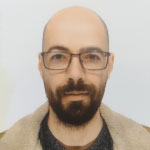 Javier Calleja Conde
Profesor de Neurobiología de la Conducta Humana
Professor of Neurobiology of Human Behavior
Doctor en Psicología acreditado por la ANECA, Máster en Psicofarmacología y Drogas de Abuso, y Licenciado en Psicología por la Universidad Complutense de Madrid. Sus principales líneas de investigación se centran en psicofarmacología de los trastornos adictivos, regulación epigenética en el consumo de alcohol, prevención de conductas adictivas, y neurobiología de sustancias alucinógenas. Sus trabajos han sido publicados en diversas revistas internacionales de alto impacto (h index: 8, Scopus) y divulgados en numerosos congresos nacionales e internacionales. Con más de 1000 horas de experiencia docente acumulada, ha impartido asignaturas relacionadas con Psicología Fisiológica, Psicobiología, y Psicofarmacología en la UCM, la Universidad Alfonso X el Sabio, La Universidad Internacional de la Rioja, y actualmente, en el Centro de Enseñanza Superior Cardenal Cisneros.
Javier Calleja Conde
Profesor de Neurobiología de la Conducta Humana
Professor of Neurobiology of Human Behavior
Doctor en Psicología acreditado por la ANECA, Máster en Psicofarmacología y Drogas de Abuso, y Licenciado en Psicología por la Universidad Complutense de Madrid. Sus principales líneas de investigación se centran en psicofarmacología de los trastornos adictivos, regulación epigenética en el consumo de alcohol, prevención de conductas adictivas, y neurobiología de sustancias alucinógenas. Sus trabajos han sido publicados en diversas revistas internacionales de alto impacto (h index: 8, Scopus) y divulgados en numerosos congresos nacionales e internacionales. Con más de 1000 horas de experiencia docente acumulada, ha impartido asignaturas relacionadas con Psicología Fisiológica, Psicobiología, y Psicofarmacología en la UCM, la Universidad Alfonso X el Sabio, La Universidad Internacional de la Rioja, y actualmente, en el Centro de Enseñanza Superior Cardenal Cisneros.
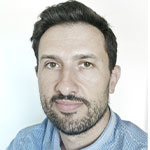 Sergio Castel Barba
Profesor de Métodos y técnicas de intervención y rehabilitación neuropsicológica
Professor of Neuropsychological Intervention and Rehabilitation Methods and Techniques
Sergio Castel Barba es Neuropsicólogo Clínico con una sólida trayectoria profesional de más de 12 años. Máster en Investigación en Psicología por la UNED, Máster en Neuropsicología Cognitiva y Licenciado en Psicología por la UCM. Es acreditado como experto en Neuropsicología Clínica y habilitado como psicólogo general sanitario y está en proceso de especializarse en terapia EMDR (niveles I y II).
A lo largo de su trayectoria, Sergio se ha especializado en la evaluación e intervención neuropsicológica de diversas poblaciones, centrándose especialmente en casos de daño cerebral adquirido, enfermedades neurodegenerativas y alteraciones del neurodesarrollo. Su profundo entendimiento de estas condiciones le ha permitido trabajar de manera efectiva con usuarios y sus familias en entornos residenciales, domiciliarios y en centros de neurorrehabilitación, colaborando estrechamente con equipos inter y transdisciplinares. Actualmente compagina su trabajo como coordinador de uno de los equipos de neurorrehabilitación en el Centro de Referencia Estatal de Atención al Daño Cerebral (CEADAC) con diversas actividades docentes y jornadas en diferentes universidades.
Su experiencia abarca también la participación activa en la validación de pruebas psicológicas en poblaciones clínicas, como el WAIS IV, CAVIDACE, el test de memoria conductual Rivermead III y el ENFEN. Asimismo, ha contribuido en la creación y validación del Test de las Anillas, una nueva herramienta para evaluar las funciones ejecutivas en adultos desde una perspectiva neuropsicológica.
Es miembro en diversas asociaciones profesionales, entre ellas la Asociación Madrileña de Neuropsicología, la Asociación Española de Psicogerontología y el Colegio Oficial de Psicología de Madrid. Su amplia experiencia y conocimiento le han permitido proponer y formar parte de comités en distintas jornadas profesionales y grupos de trabajo, contribuyendo significativamente al avance de la Neuropsicología Clínica en el ámbito profesional.
Sergio Castel Barba
Profesor de Métodos y técnicas de intervención y rehabilitación neuropsicológica
Professor of Neuropsychological Intervention and Rehabilitation Methods and Techniques
Sergio Castel Barba es Neuropsicólogo Clínico con una sólida trayectoria profesional de más de 12 años. Máster en Investigación en Psicología por la UNED, Máster en Neuropsicología Cognitiva y Licenciado en Psicología por la UCM. Es acreditado como experto en Neuropsicología Clínica y habilitado como psicólogo general sanitario y está en proceso de especializarse en terapia EMDR (niveles I y II).
A lo largo de su trayectoria, Sergio se ha especializado en la evaluación e intervención neuropsicológica de diversas poblaciones, centrándose especialmente en casos de daño cerebral adquirido, enfermedades neurodegenerativas y alteraciones del neurodesarrollo. Su profundo entendimiento de estas condiciones le ha permitido trabajar de manera efectiva con usuarios y sus familias en entornos residenciales, domiciliarios y en centros de neurorrehabilitación, colaborando estrechamente con equipos inter y transdisciplinares. Actualmente compagina su trabajo como coordinador de uno de los equipos de neurorrehabilitación en el Centro de Referencia Estatal de Atención al Daño Cerebral (CEADAC) con diversas actividades docentes y jornadas en diferentes universidades.
Su experiencia abarca también la participación activa en la validación de pruebas psicológicas en poblaciones clínicas, como el WAIS IV, CAVIDACE, el test de memoria conductual Rivermead III y el ENFEN. Asimismo, ha contribuido en la creación y validación del Test de las Anillas, una nueva herramienta para evaluar las funciones ejecutivas en adultos desde una perspectiva neuropsicológica.
Es miembro en diversas asociaciones profesionales, entre ellas la Asociación Madrileña de Neuropsicología, la Asociación Española de Psicogerontología y el Colegio Oficial de Psicología de Madrid. Su amplia experiencia y conocimiento le han permitido proponer y formar parte de comités en distintas jornadas profesionales y grupos de trabajo, contribuyendo significativamente al avance de la Neuropsicología Clínica en el ámbito profesional.
 Beatriz de Diego Lázaro
Profesora de Neuropsicología infantil y trastornos del neurodesarrollo
Professor of Child Neuropsychology and Neurodevelopmental Disorders
Beatriz de Diego es profesora ayudante doctor en el Departamento de Psicología Evolutiva de la Universidad de Valladolid e investigadora del Instituto de Neurociencias de la Universidad de Barcelona. Su investigación se centra en el aprendizaje del lenguaje y en el desarrollo de las funciones ejecutivas en niños con pérdida auditiva y niños bilingües. Es logopeda y maestra de sordos y obtuvo su doctorado en Ciencias del Habla y la Audición en la Universidad Estatal de Arizona (EE. UU.). Desde el 2009 ha trabajado como logopeda en colegios y clínicas atendiendo a niños con distintos trastornos del neurodesarrollo. Ha publicado más de una veintena de artículos en revistas de alto impacto y participado en numerosos congresos nacionales e internacionales.
Beatriz de Diego Lázaro
Profesora de Neuropsicología infantil y trastornos del neurodesarrollo
Professor of Child Neuropsychology and Neurodevelopmental Disorders
Beatriz de Diego es profesora ayudante doctor en el Departamento de Psicología Evolutiva de la Universidad de Valladolid e investigadora del Instituto de Neurociencias de la Universidad de Barcelona. Su investigación se centra en el aprendizaje del lenguaje y en el desarrollo de las funciones ejecutivas en niños con pérdida auditiva y niños bilingües. Es logopeda y maestra de sordos y obtuvo su doctorado en Ciencias del Habla y la Audición en la Universidad Estatal de Arizona (EE. UU.). Desde el 2009 ha trabajado como logopeda en colegios y clínicas atendiendo a niños con distintos trastornos del neurodesarrollo. Ha publicado más de una veintena de artículos en revistas de alto impacto y participado en numerosos congresos nacionales e internacionales.
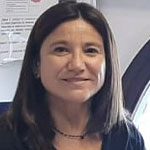 Sara Doménech Pou
Profesora de Neuropsicología de las demencias y trastornos asociados al envejecimiento
Professor of Neuropsychology of dementias and disorders associated with aging
Sara Doménech Pou es Doctora en Psicología por la Universitat de Barcelona (UB). Posee una amplia formación en Neuropsicología del Envejecimiento, en programas de estimulación cognitiva para personas con enfermedad de Alzheimer y otras demencias, participando en proyectos de investigación nacionales y europeos y con varias publicaciones sobre el tema. Ha trabajado como responsable de la Unidad de Memoria de la Fundación ACE, Alzheimer Centro Educacional en Barcelona (2000-2006) y actualmente trabaja como responsable de Investigación en el ámbito cognitivo de Fundació Salut i Envelliment de la Universitat Autònoma de Barcelona (FSiE-UAB) (2006-Actual). Posee una gran experiencia en el diseño, desarrollo e implementación de protocolos clínicos para la neurorrehabilitación de personas mayores, especialmente personas con deterioro cognitivo; en el diseño e implementación de plataformas de intervención neuropsicológica; en baterías de evaluación neuropsicológicas; en la creación de programas de estimulación cognitiva, entre otros. Ha participado como docente en varios másteres relacionados con la neuropsicología del envejecimiento en la UB y participado en varios congresos.
Sara Doménech Pou
Profesora de Neuropsicología de las demencias y trastornos asociados al envejecimiento
Professor of Neuropsychology of dementias and disorders associated with aging
Sara Doménech Pou es Doctora en Psicología por la Universitat de Barcelona (UB). Posee una amplia formación en Neuropsicología del Envejecimiento, en programas de estimulación cognitiva para personas con enfermedad de Alzheimer y otras demencias, participando en proyectos de investigación nacionales y europeos y con varias publicaciones sobre el tema. Ha trabajado como responsable de la Unidad de Memoria de la Fundación ACE, Alzheimer Centro Educacional en Barcelona (2000-2006) y actualmente trabaja como responsable de Investigación en el ámbito cognitivo de Fundació Salut i Envelliment de la Universitat Autònoma de Barcelona (FSiE-UAB) (2006-Actual). Posee una gran experiencia en el diseño, desarrollo e implementación de protocolos clínicos para la neurorrehabilitación de personas mayores, especialmente personas con deterioro cognitivo; en el diseño e implementación de plataformas de intervención neuropsicológica; en baterías de evaluación neuropsicológicas; en la creación de programas de estimulación cognitiva, entre otros. Ha participado como docente en varios másteres relacionados con la neuropsicología del envejecimiento en la UB y participado en varios congresos.
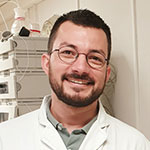 Víctor Echeverry Alzate
Profesor de Trabajo de Fin de Máster
Professor of Final Master's Project
Licenciado en Psicología, en la especialidad de Psicología y Ciencia Cognitiva, máster y Doctor en Psicofarmacología y drogas de abuso, por la Universidad Complutense de Madrid. Investigador Post-doctoral “Sara Borrell” (Instituto IBIMA, Málaga). Ha participado en labores docentes en la Facultad de Psicología de la Universidad Complutense de Madrid desde el año 2010, en las asignaturas de Fundamentos de Psicobiología I y II, Psicología Fisiológica y Aspectos Neurobiológicos y Cognitivos de las Adicciones. Además, desde ese mismo año, y formando parte del equipo del profesor Dr. Jose Antonio López Moreno (UCM), ha participado en la organización de más de once actividades de I+D+i, así como en la supervisión de varios trabajos fin de grado o máster y, actualmente, es codirector de dos tesis doctorales en curso. En el año 2009 realizó una estancia predoctoral de seis meses en el Instituto Cajal (CSIC), en el laboratorio de Neurobiología de los Ganglios Basales, con la Dra. Rosario Moratalla; y en el año 2017 una estancia postdoctoral de un año de duración en Francia, en el "Groupe de Recherche sur l’Alcool & les Pharmacodépendances (GRAP, INSERM 1247)", dirigido por el profesor Dr. Mickael Naassila. En enero de 2018, se incorporó al Grupo de Neuropsicofarmacología, de la Fundación Pública Andaluza para la Investigación de Málaga en Biomedicina y Salud (FIMABIS), dirigido por el profesor Dr. Fernando Rodríguez de Fonseca, gracias a la concesión de un contrato como investigador postdoctoral "Sara Borrell". En sus años de investigación, pre y postdoctoral, ha colaborado en 11 proyectos de investigación de ámbito nacional e internacional, llevados a cabo tanto en roedores como en humanos. Esto ha dado lugar a 22 publicaciones en revistas indexadas (64% en Q1), y más de 35 trabajos presentados en congresos nacionales e internacionales. Dentro de las áreas temáticas de sus publicaciones se encuentran la psicofarmacología, genética, enfermedades neurodegenerativas, conducta, y neurobiología de la adicción. Índice h: 10 (Scopus).
Víctor Echeverry Alzate
Profesor de Trabajo de Fin de Máster
Professor of Final Master's Project
Licenciado en Psicología, en la especialidad de Psicología y Ciencia Cognitiva, máster y Doctor en Psicofarmacología y drogas de abuso, por la Universidad Complutense de Madrid. Investigador Post-doctoral “Sara Borrell” (Instituto IBIMA, Málaga). Ha participado en labores docentes en la Facultad de Psicología de la Universidad Complutense de Madrid desde el año 2010, en las asignaturas de Fundamentos de Psicobiología I y II, Psicología Fisiológica y Aspectos Neurobiológicos y Cognitivos de las Adicciones. Además, desde ese mismo año, y formando parte del equipo del profesor Dr. Jose Antonio López Moreno (UCM), ha participado en la organización de más de once actividades de I+D+i, así como en la supervisión de varios trabajos fin de grado o máster y, actualmente, es codirector de dos tesis doctorales en curso. En el año 2009 realizó una estancia predoctoral de seis meses en el Instituto Cajal (CSIC), en el laboratorio de Neurobiología de los Ganglios Basales, con la Dra. Rosario Moratalla; y en el año 2017 una estancia postdoctoral de un año de duración en Francia, en el "Groupe de Recherche sur l’Alcool & les Pharmacodépendances (GRAP, INSERM 1247)", dirigido por el profesor Dr. Mickael Naassila. En enero de 2018, se incorporó al Grupo de Neuropsicofarmacología, de la Fundación Pública Andaluza para la Investigación de Málaga en Biomedicina y Salud (FIMABIS), dirigido por el profesor Dr. Fernando Rodríguez de Fonseca, gracias a la concesión de un contrato como investigador postdoctoral "Sara Borrell". En sus años de investigación, pre y postdoctoral, ha colaborado en 11 proyectos de investigación de ámbito nacional e internacional, llevados a cabo tanto en roedores como en humanos. Esto ha dado lugar a 22 publicaciones en revistas indexadas (64% en Q1), y más de 35 trabajos presentados en congresos nacionales e internacionales. Dentro de las áreas temáticas de sus publicaciones se encuentran la psicofarmacología, genética, enfermedades neurodegenerativas, conducta, y neurobiología de la adicción. Índice h: 10 (Scopus).
 Yolanda Higueras Hernández
Profesora de Evaluación neuropsicológica y elaboración de informes
Professor of Neuropsychological Assessment and Reporting
Doctora en Psicología por la Universidad de Bangor (Reino Unido) en 2015. Licenciada en Psicología y Máster en Neuropsicología Clínica y Neurología Conductual, ambos por la Universidad Complutense de Madrid. Acreditada como Neuropsicóloga Clínica por el Consejo General de la Psicología de España y certificada como Neuropsicóloga Clínica por EuroPsy cuenta con una amplia experiencia profesional como neuropsicóloga clínica. Actualmente combina la docencia universitaria con la investigación en Neuropsicología. Imparte clases presenciales desde 2016 en el Grado de Psicología de la Universidad Complutense como Profesor Asociado del Grado Bilingüe, así como clases de postgrado en Neuropsicología en la UNIR y la Universidad Loyola. Su investigación se centra en el campo de enfermedades desmielinizantes y desde 2013 forma parte de la Unidad de Enfermedades Desmielinizantes del Servicio de Neurología del Hospital General Universitario Gregorio Marañón.
Yolanda Higueras Hernández
Profesora de Evaluación neuropsicológica y elaboración de informes
Professor of Neuropsychological Assessment and Reporting
Doctora en Psicología por la Universidad de Bangor (Reino Unido) en 2015. Licenciada en Psicología y Máster en Neuropsicología Clínica y Neurología Conductual, ambos por la Universidad Complutense de Madrid. Acreditada como Neuropsicóloga Clínica por el Consejo General de la Psicología de España y certificada como Neuropsicóloga Clínica por EuroPsy cuenta con una amplia experiencia profesional como neuropsicóloga clínica. Actualmente combina la docencia universitaria con la investigación en Neuropsicología. Imparte clases presenciales desde 2016 en el Grado de Psicología de la Universidad Complutense como Profesor Asociado del Grado Bilingüe, así como clases de postgrado en Neuropsicología en la UNIR y la Universidad Loyola. Su investigación se centra en el campo de enfermedades desmielinizantes y desde 2013 forma parte de la Unidad de Enfermedades Desmielinizantes del Servicio de Neurología del Hospital General Universitario Gregorio Marañón.
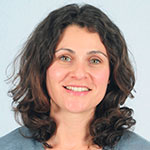 Elina Lyubomirova Boycheva
Profesora de Trastornos Neurológicos y Psicopatológicos, y de Neuropsicología de las Demencias y Trastornos Asociados al Envejecimiento
Professor of Neurological and Psychopathological Disorders, and of Neuropsychology of Dementia and Disorders Associated with Aging
Profesora adjunta de Psicología. Doctora en Neuropsicología con Mención Internacional por la Universidad de Salamanca. Premio Extraordinario de Doctorado otorgado por la misma universidad. Acreditada como Psicóloga Experta en Neuropsicología Clínica y habilitada como Psicóloga General Sanitaria (2014). Desde el año 2018 imparte docencia en inglés y en español en el Grado de Psicología de la Universidad Europea de Madrid y coordina las asignaturas de Psicofarmacología y Psicogeriatría. Desde el año 2021 dirige el Máster Universitario en Neuropsicología Clínica de la misma institución. Ha trabajado como neuropsicóloga clínica en contextos hospitalarios y desde el año 2016 es consultora clínica en ensayos clínicos nacionales e internacionales para la enfermedad de Alzheimer y el deterioro cognitivo leve. Sus principales áreas de trabajo e investigación son: evaluación e intervención neuropsicológica, enfermedades neurodegenerativas y trastornos neurocognitivos.
Elina Lyubomirova Boycheva
Profesora de Trastornos Neurológicos y Psicopatológicos, y de Neuropsicología de las Demencias y Trastornos Asociados al Envejecimiento
Professor of Neurological and Psychopathological Disorders, and of Neuropsychology of Dementia and Disorders Associated with Aging
Profesora adjunta de Psicología. Doctora en Neuropsicología con Mención Internacional por la Universidad de Salamanca. Premio Extraordinario de Doctorado otorgado por la misma universidad. Acreditada como Psicóloga Experta en Neuropsicología Clínica y habilitada como Psicóloga General Sanitaria (2014). Desde el año 2018 imparte docencia en inglés y en español en el Grado de Psicología de la Universidad Europea de Madrid y coordina las asignaturas de Psicofarmacología y Psicogeriatría. Desde el año 2021 dirige el Máster Universitario en Neuropsicología Clínica de la misma institución. Ha trabajado como neuropsicóloga clínica en contextos hospitalarios y desde el año 2016 es consultora clínica en ensayos clínicos nacionales e internacionales para la enfermedad de Alzheimer y el deterioro cognitivo leve. Sus principales áreas de trabajo e investigación son: evaluación e intervención neuropsicológica, enfermedades neurodegenerativas y trastornos neurocognitivos.
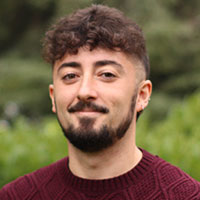 Joaquín Macedo Pascual
Profesor de Trabajo de Fin de Máster
Professor of Final Master's Project
Doctor en Psicología por la Universidad Complutense de Madrid (UCM). Máster en Neurociencia por la UCM y Graduado en Psicología por la USAL. Investigador postdoctoral en Psicología y Neurociencias contratado por la UCM. Participa en proyecto de investigación con el grupo del Centro de Investigación Nebrija en Cognición, abarcando ámbitos como la memoria, la atención, el lenguaje y los correlatos neurales de estos. También colabora con grupos de investigación de la Universidad de Bolonia en el área de técnicas de neuromodulación. Posee experiencia clínica en la atención a población infanto-juvenil y una sólida trayectoria profesional en la implementación de programas de intervención para niños con discapacidad. Además, cuenta con un amplio recorrido en la realización de proyectos de estimulación cognitiva para personas mayores.
Joaquín Macedo Pascual
Profesor de Trabajo de Fin de Máster
Professor of Final Master's Project
Doctor en Psicología por la Universidad Complutense de Madrid (UCM). Máster en Neurociencia por la UCM y Graduado en Psicología por la USAL. Investigador postdoctoral en Psicología y Neurociencias contratado por la UCM. Participa en proyecto de investigación con el grupo del Centro de Investigación Nebrija en Cognición, abarcando ámbitos como la memoria, la atención, el lenguaje y los correlatos neurales de estos. También colabora con grupos de investigación de la Universidad de Bolonia en el área de técnicas de neuromodulación. Posee experiencia clínica en la atención a población infanto-juvenil y una sólida trayectoria profesional en la implementación de programas de intervención para niños con discapacidad. Además, cuenta con un amplio recorrido en la realización de proyectos de estimulación cognitiva para personas mayores.
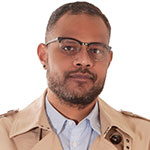 Alejandro Marín-Gutiérrez
Profesor de Trabajo de Fin de Máster
Professor of Final Master's Project
Doctor en Neuropsicología Clínica por la Universidad de Salamanca, acreditado como Profesor Contratado Doctor, Ayudante Doctor y Universidad Privada, con un sexenio de investigación. Es Máster en Neurociencia Cognitiva/Psicología Básica por la Universidad de la Laguna, y Grado en Psicología por la Universidad Nacional de Colombia. Realizó estancias de investigación en la Universidad Humboldt de Berlín en Alemania, y en la Universidad de California en Estados Unidos. Cuenta con 12 años de experiencia docente y una trayectoria de investigación de 17 años. Imparte docencia en el Máster Universitario en Psicología General Sanitaria y en el Grado en Psicología en la Universidad del Atlántico Medio, y anteriormente, trabajó como docente en la Fundación Universitaria Konrad Lorenz y en la Universidad de la Sabana, impartiendo asignaturas relacionadas con Neuropsicología, Metodología, Psicolingüística, Psicobiología, y Psicología Básica. Sus trabajos han sido publicados en diferentes revistas internacionales de alto impacto y su investigación actual se centra en actitudes lingüísticas y prejuicios implícitos hacia diferentes acentos y razas.
Alejandro Marín-Gutiérrez
Profesor de Trabajo de Fin de Máster
Professor of Final Master's Project
Doctor en Neuropsicología Clínica por la Universidad de Salamanca, acreditado como Profesor Contratado Doctor, Ayudante Doctor y Universidad Privada, con un sexenio de investigación. Es Máster en Neurociencia Cognitiva/Psicología Básica por la Universidad de la Laguna, y Grado en Psicología por la Universidad Nacional de Colombia. Realizó estancias de investigación en la Universidad Humboldt de Berlín en Alemania, y en la Universidad de California en Estados Unidos. Cuenta con 12 años de experiencia docente y una trayectoria de investigación de 17 años. Imparte docencia en el Máster Universitario en Psicología General Sanitaria y en el Grado en Psicología en la Universidad del Atlántico Medio, y anteriormente, trabajó como docente en la Fundación Universitaria Konrad Lorenz y en la Universidad de la Sabana, impartiendo asignaturas relacionadas con Neuropsicología, Metodología, Psicolingüística, Psicobiología, y Psicología Básica. Sus trabajos han sido publicados en diferentes revistas internacionales de alto impacto y su investigación actual se centra en actitudes lingüísticas y prejuicios implícitos hacia diferentes acentos y razas.
 Manuela Martín-Bejarano
Profesora de Evaluación Neuropsicológica y Elaboración de Informes
Professor of Neuropsychological Evaluation and Report Preparation
Doctoranda con Mención Internacional por la Universidad de Cádiz. Autora de diversos artículos científicos publicados en revistas de alto impacto. Acreditada como Profesional de la Psicología Experta en Neuropsicología Clínica por el Consejo General de Colegios Oficiales de Psicólogos y habilitada como Psicóloga General Sanitaria según la legislación vigente, cuenta con más de 8 años de dedicación al campo de la Neuropsicología. Su experiencia se extiende a la contribución en proyectos de investigación tanto a nivel nacional como internacional, así como en diversos entornos hospitalarios, tanto públicos como privados. Sus áreas de especialización abarcan la evaluación e intervención neuropsicológica, con un enfoque particular en poblaciones infanto-juveniles y adultos mayores. Además, ha desarrollado conocimientos en neuroimagen y estimulación magnética transcraneal.
Manuela Martín-Bejarano
Profesora de Evaluación Neuropsicológica y Elaboración de Informes
Professor of Neuropsychological Evaluation and Report Preparation
Doctoranda con Mención Internacional por la Universidad de Cádiz. Autora de diversos artículos científicos publicados en revistas de alto impacto. Acreditada como Profesional de la Psicología Experta en Neuropsicología Clínica por el Consejo General de Colegios Oficiales de Psicólogos y habilitada como Psicóloga General Sanitaria según la legislación vigente, cuenta con más de 8 años de dedicación al campo de la Neuropsicología. Su experiencia se extiende a la contribución en proyectos de investigación tanto a nivel nacional como internacional, así como en diversos entornos hospitalarios, tanto públicos como privados. Sus áreas de especialización abarcan la evaluación e intervención neuropsicológica, con un enfoque particular en poblaciones infanto-juveniles y adultos mayores. Además, ha desarrollado conocimientos en neuroimagen y estimulación magnética transcraneal.
 José Félix Mozo del Castillo
Profesor de Neuropsicología de la Atención, la Percepción y las Praxias
Professor of Neuropsychology of Attention, Perception and Praxias
Licenciado en Psicología (Universidad Complutense de Madrid), Máster oficial en Rehabilitación Neurológica y Estimulación Cognitiva (Universidad Autónoma de Barcelona) y Doctorando (Universidad Complutense de Madrid). Experto en neuropsicología clínica (acreditación del Consejo General de la Psicología de España). Miembro activo de la Sección de Neuropsicología (Sociedad Española de Neurología) y miembro adherido a otras sociedades científicas (Sección Neuropsicología del Colegio Oficial de Psicólogos Madrid y Asociación Madrileña de Neuropsicología). Posee más de 10 años de experiencia docente, más de 18.000 horas de práctica profesional, y comunicaciones orales o escritas en congresos, seminarios, simposios, revistas y otras áreas de difusión científica.
José Félix Mozo del Castillo
Profesor de Neuropsicología de la Atención, la Percepción y las Praxias
Professor of Neuropsychology of Attention, Perception and Praxias
Licenciado en Psicología (Universidad Complutense de Madrid), Máster oficial en Rehabilitación Neurológica y Estimulación Cognitiva (Universidad Autónoma de Barcelona) y Doctorando (Universidad Complutense de Madrid). Experto en neuropsicología clínica (acreditación del Consejo General de la Psicología de España). Miembro activo de la Sección de Neuropsicología (Sociedad Española de Neurología) y miembro adherido a otras sociedades científicas (Sección Neuropsicología del Colegio Oficial de Psicólogos Madrid y Asociación Madrileña de Neuropsicología). Posee más de 10 años de experiencia docente, más de 18.000 horas de práctica profesional, y comunicaciones orales o escritas en congresos, seminarios, simposios, revistas y otras áreas de difusión científica.
 Mónica Muiños Durán
Profesora de Neuropsicología de la atención, la percepción y las praxias
Professor of Neuropsychology of attention, perception and praxis
Doctora en Psicología acreditada por la ANECA, Máster en Psicología y Licenciada en Psicología Clínica por la UNED. Imparte docencia en la Universidad Internacional de Valencia en el Grado en Psicología y en el Máster en Neuropsicología Clínica. Su investigación se centra en atención y percepción, percepción visual aplicado al deporte y envejecimiento y enfermedades neurodegenerativas. Sus trabajos han sido divulgados en diferentes revistas indexadas en el JCR y en numerosos congresos nacionales e internacionales. Índice h: 7 (Scopus).
Mónica Muiños Durán
Profesora de Neuropsicología de la atención, la percepción y las praxias
Professor of Neuropsychology of attention, perception and praxis
Doctora en Psicología acreditada por la ANECA, Máster en Psicología y Licenciada en Psicología Clínica por la UNED. Imparte docencia en la Universidad Internacional de Valencia en el Grado en Psicología y en el Máster en Neuropsicología Clínica. Su investigación se centra en atención y percepción, percepción visual aplicado al deporte y envejecimiento y enfermedades neurodegenerativas. Sus trabajos han sido divulgados en diferentes revistas indexadas en el JCR y en numerosos congresos nacionales e internacionales. Índice h: 7 (Scopus).
 María Dolores Nieto Cañaveras
Profesora de Trabajo de Fin de Máster
Professor of Final Master's Project
María Dolores Nieto es graduada en Psicología, máster en Metodología de las Ciencias del Comportamiento y de la Salud con Trabajo Fin de Máster calificado con Matrícula de Honor, y doctora en Psicología Clínica y de la Salud con mención internacional por la Universidad Autónoma de Madrid. Entre el 2016 y el 2018, durante la realización de su tesis doctoral, estuvo contratada en prácticas en la Cátedra de Modelos y Aplicaciones Psicométricos (Universidad Autónoma de Madrid–Instituto de Ingeniería del Conocimiento). En 2017 fue premiada con la Ayuda Julio Olea a Jóvenes Investigadores por la Asociación Española de Metodología de las Ciencias del Comportamiento y de la Salud. Su actividad investigadora se centra en los test adaptativos informatizados, el análisis factorial y de la dimensionalidad, y los sesgos de respuesta. Ha publicado en revistas internacionales de reconocido prestigio tales como Psychological Assessment y ha realizado numerosas contribuciones a congresos nacionales e internacionales. Forma parte del equipo de investigación Modelos y Aplicaciones Psicométricas de la Universidad Autónoma de Madrid y participa en varios proyectos de investigación de distinta índole. Asimismo, trabaja en el desarrollo de software y herramientas interactivas relacionadas con la psicometría y el análisis de datos para uso docente, aplicado e investigador. También tiene experiencia docente en cursos sobre manejo de software para el análisis estadístico.
María Dolores Nieto Cañaveras
Profesora de Trabajo de Fin de Máster
Professor of Final Master's Project
María Dolores Nieto es graduada en Psicología, máster en Metodología de las Ciencias del Comportamiento y de la Salud con Trabajo Fin de Máster calificado con Matrícula de Honor, y doctora en Psicología Clínica y de la Salud con mención internacional por la Universidad Autónoma de Madrid. Entre el 2016 y el 2018, durante la realización de su tesis doctoral, estuvo contratada en prácticas en la Cátedra de Modelos y Aplicaciones Psicométricos (Universidad Autónoma de Madrid–Instituto de Ingeniería del Conocimiento). En 2017 fue premiada con la Ayuda Julio Olea a Jóvenes Investigadores por la Asociación Española de Metodología de las Ciencias del Comportamiento y de la Salud. Su actividad investigadora se centra en los test adaptativos informatizados, el análisis factorial y de la dimensionalidad, y los sesgos de respuesta. Ha publicado en revistas internacionales de reconocido prestigio tales como Psychological Assessment y ha realizado numerosas contribuciones a congresos nacionales e internacionales. Forma parte del equipo de investigación Modelos y Aplicaciones Psicométricas de la Universidad Autónoma de Madrid y participa en varios proyectos de investigación de distinta índole. Asimismo, trabaja en el desarrollo de software y herramientas interactivas relacionadas con la psicometría y el análisis de datos para uso docente, aplicado e investigador. También tiene experiencia docente en cursos sobre manejo de software para el análisis estadístico.
 Maria Nuñez Bernardos
Profesora de Trabajo de Fin de Máster
Professor of Final Master's Project
Licenciada y Doctora en Psicología por la Universidad Autónoma de Madrid. Durante 25 años desempeñó su carrera académica en el Reino Unido. Comenzó como investigadora postdoctoral en la Universidad de Oxford y fue profesora e investigadora en las Universidades de Kent, Glasgow Caledonian y King’s College London. También en el Reino Unido ha sido investigadora invitada en diversos centros de prestigio, entre otros el Center for Brain and Cognitive Development (CBCD), Wales Autism Reserach Center (WARC) y St John’s College, Oxford. Retornó a España en 2020 como investigadora distinguida Beatriz Galindo Senior, programa de atracción de talento del Ministerio de Ciencia y Universidades cuyo objetivo es traer la experiencia de académicos internacionales a las universidades españolas. Es experta en desarrollo temprano y neurodiversidad, áreas en las que ha completado numerosos proyectos de investigación como IP y publicado con sus colaboradores. Desde enero de 2024 es profesora agregada de la Universidad Nebrija donde ha comenzado un proyecto para la creación de un centro de desarrollo temprano y neurodiversidad. Como especialista en neurodesarrollo es miembro del comité ejecutivo de la Jean Piaget Society y de las redes de investigación Respect for Neurodevelopment y REAL (Red de investigación en Autismo Latinoamérica).
Maria Nuñez Bernardos
Profesora de Trabajo de Fin de Máster
Professor of Final Master's Project
Licenciada y Doctora en Psicología por la Universidad Autónoma de Madrid. Durante 25 años desempeñó su carrera académica en el Reino Unido. Comenzó como investigadora postdoctoral en la Universidad de Oxford y fue profesora e investigadora en las Universidades de Kent, Glasgow Caledonian y King’s College London. También en el Reino Unido ha sido investigadora invitada en diversos centros de prestigio, entre otros el Center for Brain and Cognitive Development (CBCD), Wales Autism Reserach Center (WARC) y St John’s College, Oxford. Retornó a España en 2020 como investigadora distinguida Beatriz Galindo Senior, programa de atracción de talento del Ministerio de Ciencia y Universidades cuyo objetivo es traer la experiencia de académicos internacionales a las universidades españolas. Es experta en desarrollo temprano y neurodiversidad, áreas en las que ha completado numerosos proyectos de investigación como IP y publicado con sus colaboradores. Desde enero de 2024 es profesora agregada de la Universidad Nebrija donde ha comenzado un proyecto para la creación de un centro de desarrollo temprano y neurodiversidad. Como especialista en neurodesarrollo es miembro del comité ejecutivo de la Jean Piaget Society y de las redes de investigación Respect for Neurodevelopment y REAL (Red de investigación en Autismo Latinoamérica).
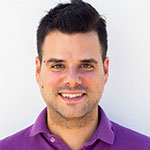 Manuel Reiriz Rojas
Profesor de Trabajo de Fin de Máster
Professor of Final Master's Project
Licenciado en Biología, con Máster Universitario en Fisiología y Neurociencias, presentó su tesis doctoral en el año 2017 en la Universidad de Sevilla investigando las diferentes regiones telencefálicas implicadas en las conductas emocionales en los peces Teleósteos. Gracias a la concesión de una beca FPI (del Ministerio de Economía y Competitividad del Gobierno de España) pudo desempeñar docencia durante el desarrollo de su Tesis Doctoral, impartiendo asignaturas tanto troncales como optativas, en el Área de Psicobiología de la Facultad de Psicología de la Universidad de Sevilla. Entre ellas, se pueden destacar las asignaturas de Fundamentos en Psicobiología y Psicobiología Sistémica, o asignaturas que imparte en la actualidad asociadas a esta rama de la Psicología, como es la asignatura de Procesos Cognitivos y Educación que se imparte en el Máster en Cognición y Emoción en Contextos Educativos en la Universidad Antonio de Nebrija. Actualmente, imparte también diferentes asignaturas específicas dentro de la especialidad de Biología y Geología en el Máster Universitario en Formación del Profesorado de Educación Secundaria Obligatoria y Bachillerato, Formación Profesional y Enseñanza de Idiomas, en la Universidad Antonio de Nebrija. Ha ejercido como tutor y como miembro de tribunales de evaluación de TFM y TFG, así como tutor de Practicum. Durante su etapa docente, ha realizado diferentes cursos de formación para la mejora de la docencia, como cursos de innovación docentes o de formación del profesorado en entornos docentes digitales. Además, ha asistidos a diferentes congresos Docentes en los que ha podido mostrar algunos de sus resultados en el campo de la Educación. Respecto a su producción científica, Manuel posee diferentes publicaciones en congresos tanto nacionales como internacionales, y publicaciones en diferentes revistas de prestigio. Su producción científica, siempre se ha dirigido al estudio desde un punto de vista evolutivo, del procesamiento neural de diferentes emociones. Sus publicaciones se centran en el estudio anatómico y funcional de diferentes subregiones telencefálicas que podrían estar implicadas en el control de las emociones, y en las distintas conductas que son desencadenadas por las mismas. Por último, Manuel ha formado parte de varios proyectos de Investigación I + D, financiados por el Gobierno de España.
Manuel Reiriz Rojas
Profesor de Trabajo de Fin de Máster
Professor of Final Master's Project
Licenciado en Biología, con Máster Universitario en Fisiología y Neurociencias, presentó su tesis doctoral en el año 2017 en la Universidad de Sevilla investigando las diferentes regiones telencefálicas implicadas en las conductas emocionales en los peces Teleósteos. Gracias a la concesión de una beca FPI (del Ministerio de Economía y Competitividad del Gobierno de España) pudo desempeñar docencia durante el desarrollo de su Tesis Doctoral, impartiendo asignaturas tanto troncales como optativas, en el Área de Psicobiología de la Facultad de Psicología de la Universidad de Sevilla. Entre ellas, se pueden destacar las asignaturas de Fundamentos en Psicobiología y Psicobiología Sistémica, o asignaturas que imparte en la actualidad asociadas a esta rama de la Psicología, como es la asignatura de Procesos Cognitivos y Educación que se imparte en el Máster en Cognición y Emoción en Contextos Educativos en la Universidad Antonio de Nebrija. Actualmente, imparte también diferentes asignaturas específicas dentro de la especialidad de Biología y Geología en el Máster Universitario en Formación del Profesorado de Educación Secundaria Obligatoria y Bachillerato, Formación Profesional y Enseñanza de Idiomas, en la Universidad Antonio de Nebrija. Ha ejercido como tutor y como miembro de tribunales de evaluación de TFM y TFG, así como tutor de Practicum. Durante su etapa docente, ha realizado diferentes cursos de formación para la mejora de la docencia, como cursos de innovación docentes o de formación del profesorado en entornos docentes digitales. Además, ha asistidos a diferentes congresos Docentes en los que ha podido mostrar algunos de sus resultados en el campo de la Educación. Respecto a su producción científica, Manuel posee diferentes publicaciones en congresos tanto nacionales como internacionales, y publicaciones en diferentes revistas de prestigio. Su producción científica, siempre se ha dirigido al estudio desde un punto de vista evolutivo, del procesamiento neural de diferentes emociones. Sus publicaciones se centran en el estudio anatómico y funcional de diferentes subregiones telencefálicas que podrían estar implicadas en el control de las emociones, y en las distintas conductas que son desencadenadas por las mismas. Por último, Manuel ha formado parte de varios proyectos de Investigación I + D, financiados por el Gobierno de España.
 Benjamín Rodríguez Expósito
Profesor de Neuropsicología de la memoria, el lenguaje y las funciones ejecutivas
Professor of Neuropsychology of memory, language and executive functions
Licenciado en Biología y Doctor por la Universidad de Sevilla. Mater universitario de especialización en Fisiología y Neurociencia. A lo largo de su carrera como docente ha impartido docencia teórica y práctica en diversas asignaturas troncales, obligatorias y optativas del Grado de Psicología, desarrollando dicha actividad docente en diversas universidades como la Universidad de Sevilla, la Universidad de Huelva y la Universidad Nacional de Educación a Distancia (UNED). Así como profesor de la asignatura de Procesos cognitivos y educación dentro del Master en Cognición y emoción en contextos educativos de la Universidad de Nebrija. Asimismo, imparte asignaturas específicas dentro de la especialidad de Biología y Geología en el Máster Universitario en Formación del Profesorado de Educación Secundaria Obligatoria y Bachillerato, Formación Profesional y Enseñanza de Idiomas de la Universidad Antonio de Nebrija. Ha participado como tutor de Trabajos Fin de Master tanto en el máster universitario de Fisiología y Neurociencia de la Universidad de Sevilla, como en el Máster Universitario en Formación del Profesorado de Educación Secundaria Obligatoria y Bachillerato, Formación Profesional y Enseñanza de Idiomas de la Universidad Antonio de Nebrija. Así como tutor profesional de Prácticum de Investigación. En cuanto a su producción científica, es autor/coautor de diversas publicaciones científicas en revistas de reconocido prestigio e incluidas en el Journal Citation Report, tales como Behavioural Brain Research, Physiology and Behaviour y Neurobiology of Learning and Memory, enmarcadas en la investigación de los procesos cognitivos, así como de su substrato neural, relacionados con el aprendizaje relacional y los sistemas de memoria. Contando las mismas con un alto índice de impacto y con posiciones destacadas dentro del campo de estudio de la neurociencia. Asimismo, ha participado en cursos, seminarios de especialización y congresos científicos tanto nacionales como internacionales, contribuyendo en estos últimos con diversas publicaciones. Ha participado como investigador en varios proyectos de investigación nacionales dentro del Plan Nacional de I+D del Gobierno de España, relacionados con el estudio de las bases neurales y procesos cognitivos de los sistemas de memoria relacional y emocional.
Benjamín Rodríguez Expósito
Profesor de Neuropsicología de la memoria, el lenguaje y las funciones ejecutivas
Professor of Neuropsychology of memory, language and executive functions
Licenciado en Biología y Doctor por la Universidad de Sevilla. Mater universitario de especialización en Fisiología y Neurociencia. A lo largo de su carrera como docente ha impartido docencia teórica y práctica en diversas asignaturas troncales, obligatorias y optativas del Grado de Psicología, desarrollando dicha actividad docente en diversas universidades como la Universidad de Sevilla, la Universidad de Huelva y la Universidad Nacional de Educación a Distancia (UNED). Así como profesor de la asignatura de Procesos cognitivos y educación dentro del Master en Cognición y emoción en contextos educativos de la Universidad de Nebrija. Asimismo, imparte asignaturas específicas dentro de la especialidad de Biología y Geología en el Máster Universitario en Formación del Profesorado de Educación Secundaria Obligatoria y Bachillerato, Formación Profesional y Enseñanza de Idiomas de la Universidad Antonio de Nebrija. Ha participado como tutor de Trabajos Fin de Master tanto en el máster universitario de Fisiología y Neurociencia de la Universidad de Sevilla, como en el Máster Universitario en Formación del Profesorado de Educación Secundaria Obligatoria y Bachillerato, Formación Profesional y Enseñanza de Idiomas de la Universidad Antonio de Nebrija. Así como tutor profesional de Prácticum de Investigación. En cuanto a su producción científica, es autor/coautor de diversas publicaciones científicas en revistas de reconocido prestigio e incluidas en el Journal Citation Report, tales como Behavioural Brain Research, Physiology and Behaviour y Neurobiology of Learning and Memory, enmarcadas en la investigación de los procesos cognitivos, así como de su substrato neural, relacionados con el aprendizaje relacional y los sistemas de memoria. Contando las mismas con un alto índice de impacto y con posiciones destacadas dentro del campo de estudio de la neurociencia. Asimismo, ha participado en cursos, seminarios de especialización y congresos científicos tanto nacionales como internacionales, contribuyendo en estos últimos con diversas publicaciones. Ha participado como investigador en varios proyectos de investigación nacionales dentro del Plan Nacional de I+D del Gobierno de España, relacionados con el estudio de las bases neurales y procesos cognitivos de los sistemas de memoria relacional y emocional.
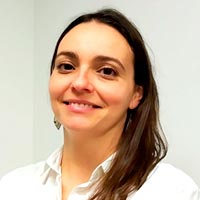 Elisa Rodríguez Ortega
Profesora de Neuropsicología de la memoria, el lenguaje y las funciones ejecutivas
Professor of Neuropsychology of memory, language and executive functions
Doctora en Salud, Psicología y Psiquiatría, Licenciada en Psicología, Máster en Investigación en Salud Mental y Licenciada en Psicología. Profesora Acreditada con un sexenio de investigación. Tiene amplia experiencia docente en diversas asignaturas en el ámbito de la Psicología y compagina su actividad docente en varias universidades con su actividad investigadora. Ha sido investigadora durante tres años en el Instituto de Investigación Sanitaria del Hospital La Princesa en Madrid y es miembro activo del grupo de investigación CTS-280: Psicofarmacología y Neurotoxicología” de la Universidad de Almería. Su investigación se enmarca en el área de la psicobiología, centrándose en la prevención y tratamiento de adicciones, la formación de memoria emocional, las enfermedades neurodegenerativas y la psicobiología de la educación.
Elisa Rodríguez Ortega
Profesora de Neuropsicología de la memoria, el lenguaje y las funciones ejecutivas
Professor of Neuropsychology of memory, language and executive functions
Doctora en Salud, Psicología y Psiquiatría, Licenciada en Psicología, Máster en Investigación en Salud Mental y Licenciada en Psicología. Profesora Acreditada con un sexenio de investigación. Tiene amplia experiencia docente en diversas asignaturas en el ámbito de la Psicología y compagina su actividad docente en varias universidades con su actividad investigadora. Ha sido investigadora durante tres años en el Instituto de Investigación Sanitaria del Hospital La Princesa en Madrid y es miembro activo del grupo de investigación CTS-280: Psicofarmacología y Neurotoxicología” de la Universidad de Almería. Su investigación se enmarca en el área de la psicobiología, centrándose en la prevención y tratamiento de adicciones, la formación de memoria emocional, las enfermedades neurodegenerativas y la psicobiología de la educación.
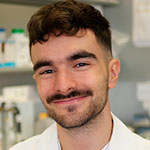 Álvaro Ruiz García
Profesor de Trastornos Neurológicos y Psicopatológicos
Professor of Neurological and Psychopathological Disorders
Graduado en Psicología, Máster en Neurociencia y Máster en Psicología General Sanitaria por la Universidad Complutense de Madrid. Actualmente, compagina la docencia en la Universidad Nebrija y la Universitat Oberta de Catalunya con su labor como neurocientífico en el Hospital Universitario 12 de Octubre de Madrid. Su trabajo se centra en desentrañar la compleja relación entre la función afectiva y los procesos cognitivos en envejecimiento sano y patológico. Además, complementa su trayectoria profesional como neuropsicólogo clínico y psicólogo sanitario, trabajando con personas con daño cerebral adquirido (especialmente con pacientes de ictus y Alzheimer) y con personas con trastorno límite de la personalidad.
Álvaro Ruiz García
Profesor de Trastornos Neurológicos y Psicopatológicos
Professor of Neurological and Psychopathological Disorders
Graduado en Psicología, Máster en Neurociencia y Máster en Psicología General Sanitaria por la Universidad Complutense de Madrid. Actualmente, compagina la docencia en la Universidad Nebrija y la Universitat Oberta de Catalunya con su labor como neurocientífico en el Hospital Universitario 12 de Octubre de Madrid. Su trabajo se centra en desentrañar la compleja relación entre la función afectiva y los procesos cognitivos en envejecimiento sano y patológico. Además, complementa su trayectoria profesional como neuropsicólogo clínico y psicólogo sanitario, trabajando con personas con daño cerebral adquirido (especialmente con pacientes de ictus y Alzheimer) y con personas con trastorno límite de la personalidad.
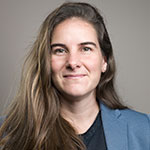 Sara Uceda Gutiérrez
Profesora de Trabajo de Fin de Máster
Professor of Final Master's Project
Licenciada en Psicología, Máster en Fisiología y Neurociencias y Doctora por la Universidad de Sevilla con Mención Internacional. Actualmente es Decana de la Facultad de Ciencias de la Vida y de la Naturaleza y Directora del Departamento de Psicología de la Universidad Nebrija. Docente e investigadora del Área de Psicobiología, sus intereses están centrados en procesos cognitivos como el aprendizaje, la memoria, la emoción o la atención. Cuenta con amplia experiencia docente tanto en cursos de grado como de máster, ha participado y participa en varios proyectos científicos nacionales e internacionales y es autora de diversos artículos científicos publicados en revistas con un alto factor de impacto e indexadas en el Journal Citation Reports.
Sara Uceda Gutiérrez
Profesora de Trabajo de Fin de Máster
Professor of Final Master's Project
Licenciada en Psicología, Máster en Fisiología y Neurociencias y Doctora por la Universidad de Sevilla con Mención Internacional. Actualmente es Decana de la Facultad de Ciencias de la Vida y de la Naturaleza y Directora del Departamento de Psicología de la Universidad Nebrija. Docente e investigadora del Área de Psicobiología, sus intereses están centrados en procesos cognitivos como el aprendizaje, la memoria, la emoción o la atención. Cuenta con amplia experiencia docente tanto en cursos de grado como de máster, ha participado y participa en varios proyectos científicos nacionales e internacionales y es autora de diversos artículos científicos publicados en revistas con un alto factor de impacto e indexadas en el Journal Citation Reports.
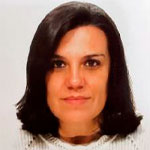 Sara Valiente Rodríguez
Profesora de Neuropsicología infantil y trastornos del neurodesarrollo
Professor of Child Neuropsychology and Neurodevelopmental Disorders
Doctora en Psicología por la Universidad Complutense, así como diversos másteres en áreas específicas como Neuropsicología Infantil, Atención Temprana y Psicomotricidad, e Intervención Temprana. Su experiencia y conocimientos se centran en la evaluación e intervención neuropsicológica, y cuenta con una amplia experiencia en atención temprana, neuropsicología infantil y clínica. Su labor profesional se extiende tanto a la docencia como a su destacado trabajo como neuropsicóloga infantil en la Unidad de Pediatría del Hospital Ruber Internacional de Madrid. Además, es directora de su propio despacho profesional, donde lleva brindando atención y apoyo a la población infanto-juvenil desde hace más de una década.
Sara Valiente Rodríguez
Profesora de Neuropsicología infantil y trastornos del neurodesarrollo
Professor of Child Neuropsychology and Neurodevelopmental Disorders
Doctora en Psicología por la Universidad Complutense, así como diversos másteres en áreas específicas como Neuropsicología Infantil, Atención Temprana y Psicomotricidad, e Intervención Temprana. Su experiencia y conocimientos se centran en la evaluación e intervención neuropsicológica, y cuenta con una amplia experiencia en atención temprana, neuropsicología infantil y clínica. Su labor profesional se extiende tanto a la docencia como a su destacado trabajo como neuropsicóloga infantil en la Unidad de Pediatría del Hospital Ruber Internacional de Madrid. Además, es directora de su propio despacho profesional, donde lleva brindando atención y apoyo a la población infanto-juvenil desde hace más de una década.
More Academic Information
Competences
Knowledge or content- K1. Graduates graduate will differentiate the neurobiological bases of human behavior from a molecular, cellular, systemic, behavioral and cognitive perspective.
- K2. Graduates will identify neurological and psychopathological disorders, working on the possibilities of neuropsychological rehabilitation.
- K3. Graduates will describe the neural bases of attention, perception and motor processing, as well as their possible alterations and their neuropsychological rehabilitation.
- K4. Graduates will identify the neural bases of memory, language and executive functions, their possible alterations and their neuropsychological rehabilitation.
- K5. Graduates will distinguish the main tests, instruments and techniques for conducting neuropsychological assessments and reporting.
- K6. Graduates will identify the main methods and techniques of neuropsychological intervention throughout the life cycle.
- K7. Graduates will compare the characteristics, objectives, approaches and evaluation of intervention programs in neuropsychology.
- K8. Graduates will differentiate the neurodegenerative process, its causes and characteristics, as well as the specific assessment instruments and its neuropsychological rehabilitation.
- K9. Graduates will assess the behavioral patterns and developmental disorders in children and adolescents, as well as the specific evaluation instruments and their neuropsychological rehabilitation.
- K10. Graduates will differentiate the methods and tools for the collection and analysis of data in Health Sciences.
- K11. Graduates will identify the protection measures and safety culture in the professional context, including what is related to the patient's clinical history.
- K12. Graduates will recognize the principles of evidence-based practice, the structure of an academic paper or scientific report, and its public defense in the field of Neuropsychology.
- H1. Graduates will be able to select and analyze the information contained in scientific databases in order to continuously be kept up to date professionally in the field of Neuropsychology.
- H2. Graduates will be able to examine and use current models and theories on the relationship between the central nervous system and cognitive abilities and human behavior.
- H3. Graduates will be able to distinguish and use the most relevant knowledge in the field of neuroscience and neuropsychology for professional practice.
- H4. Graduates will be able to examine and assess the neurodevelopment of cognitive functions, their functioning and their alterations.
- H5. Graduates will be able to analyze, characterize and differentiate the neuropsychological alterations associated with neurological and psychopathological disorders.
- H6. Graduates will be able to distinguish and apply the different models, techniques and procedures of evaluation, rehabilitation and neuropsychological intervention.
- H7. Graduates will be able to formulate working hypotheses and collect and assess critically and advanced information for problem solving through the application of the scientific method in the field of Neuropsychology.
- H8. Graduates will be able to generate new ideas based on scientific evidence and design intervention strategies in the field of Neuropsychology.
- C1. Graduates will be able to plan and carry out neuropsychological assessments from the set of data processed with social and ethical responsibility.
- C2. Graduates will be able to select and design proposals for neuropsychological intervention from the set of data processed in the evaluation.
- C3. Graduates will be able to prepare neuropsychological reports with wording adapted to the recipients.
- C4. Graduates will be able to design and develop research in neuropsychology.
- C5. Graduates will be able to develop proposals for neuropsychological intervention in interdisciplinary teams.
- C6. Graduates will be able to use information and communication technologies in the professional performance of the neuropsychologist.
- C7. Graduates will be able to carry out the work of the neuropsychologist respecting ethics and professional deontology, in accordance with current legislation.
- C8. Graduates will be able to observe and apply the knowledge acquired in the master's degree in real contexts, participating in work teams in the field of Neuropsychology.
- C9. Graduates will be able to apply the knowledge acquired in the Master's degree to develop, present and defend work in the area of Neuropsychology.
Face-to-face and Distance Learning
Our master's degree in Neuropsychology allows you to study both in-person and remotely. The in-person modality will give you the experience of interacting directly with experts and fellow students, while the distance modality will offer you the comfort of learning from anywhere, adapting your study pace to your needs.
Calendar and Schedules
General calendar Academic calendar
Face-to-face modality
- Course start: September 25, 2023.
- Schedules: Face-to-face classes from Monday to Friday between 4:30 p.m. and 9:30 p.m.
- Internships: In-person.
Distance learning modality
- Course start: March 2024 (date to be determined).
- Schedules: Synchronous classes in the afternoon between 4:30 p.m. and 9:30 p.m., in addition to the syllabus provided to the student.
- Internships: In-person.
Admission
Admission Requirements
Pursuant to Article 18 of RD 822/2021, eligibility for these studies is granted to students fulfilling at least one of the criteria outlined below:
- Possession of an official Spanish Bachelor's degree, or its equivalent. Alternatively, holders of another University Master's degree, or qualifications that are on par with Spanish Bachelor’s or Master's degrees, bestowed by universities and higher education institutions in EHEA countries, are also eligible. These qualifications should permit entry to Master’s level studies in the issuing country.
- Additionally, individuals holding degrees from non-EHEA education systems, equivalent to a Bachelor’s degree, can enroll in a Master’s program within the Spanish university system. There is no requirement for degree homologation; however, the university will undertake a verification process to ascertain the level of training provided by the degree. Admission is granted, provided the degree enables the holder to undertake postgraduate level studies in the country of issuance. It should be noted that admission via this route does not constitute homologation of the applicant's prior degree, nor is it recognized for any purpose other than enrollment in Master’s studies.
- For students with special educational needs arising from disabilities, an assessment will be conducted to determine the necessity of curricular adaptations, tailored itineraries, or alternative study paths to facilitate their learning process.
Regulations and general admission procedure
Regulations and general admission procedure
Recommended admission profile
Those interested in studying and obtaining the Master's degree in Neuropsychology from the Antonio de Nebrija University, in addition to meeting the requirements imposed by current legislation, must be in possession of a degree belonging to the field of behavioral sciences and psychology.
In the event that the candidate's mother tongue is not Spanish, they must prove to have a B2 level of Spanish, through any accredited certificate.
El proceso de admisión al Máster comienza por remitir por correo postal o mensajería a la Sección de Admisiones de Postgrado la documentación siguiente:The admission process to the Master's Degree begins by sending the following documentation by postal mail or courier to the Postgraduate Admissions Section:
- Completed Admission Application Admission Application
- Updated Curriculum Vitae
- hotocopy of DNI (Spanish candidates only) or passport (foreign candidates only)
- Photocopy of the Academic Transcript (completed or for the last year of the university degree)
- Two passport-size photographs, in color.
- Certified photocopy of the official Diploma for Associate's/Bachelor's Degree in Psychology.
- Letter addressed to the Director of the Master's Program in Teaching and Learning Educational Processes, explaining the reasons why you wish to pursue Master's studies, as well as the academic and professional expectations that lead you to this choice.
In addition to evaluating the academic merits provided by the candidate, a personal interview is a mandatory component of the admission process. The interview is conducted by the academic direction of the Master's Degree in Neuropsychology at Antonio de Nebrija University or by a member of the faculty. Its purpose is to assess the candidate’s suitability and alignment with the degree requirements, considering their motivation, training, knowledge, abilities, communication skills, extracurricular activities, and future interests.
Candidates are evaluated on a scale of 0 to 10 for both pre-admission and admission, considering various criteria and their respective weightages:
- Academic record [70%]
The grades obtained by the candidate in their previous studies will be assessed. - Structured personal interview [20%]
The candidate's aptitude is evaluated considering a spectrum of factors including their experience, knowledge, and the technical and professional skills necessary for the intended course of study. Not only are the candidates’ qualifications considered, but equal emphasis is placed on their motivation and attitude. Various personal attributes that signify the candidates’ compatibility and readiness for the chosen program are thoroughly examined. The interview may be conducted in the language of instruction for the intended studies to assess linguistic proficiency and readiness for academic engagement. - Cover letter [10%] In a personally prepared document, the candidate will outline their motivation and interest in the desired studies and include any other personal circumstances deemed relevant to the selection process.
Pre-enrollment
Once admission is confirmed, candidates are required to secure their place through an economic pre-enrollment. This fee ensures the candidate's spot at the University. The annual registration fees are non-refundable, except for conditionally admitted students or those who fail to meet the legal access requirements.
Enrollment
Pre-enrolled candidates who wish to formalize their academic enrollment at the University must, within the indicated deadlines, follow these steps:
- Submission of Documentation: Candidates must provide documents as proof of meeting the requirements mandated by Spanish university legislation for admission to Nebrija University.
- Formalize enrollment process online: Admitted students can use the self-enrollment service on the Nebrija website for all academic, financial, and administrative procedures, eliminating the need for their physical presence at the University. Access codes and a personal password will be sent along with the admission letter to facilitate this process. With verification of submitted documents, candidates complete their self-enrollment and become official students of Nebrija University. During self-enrollment, technical support from the Computer Services department and academic guidance from assigned tutors are available to assist in subject selection.
- Payment of annual registration fees: Candidates must pay the annual registration fees for the admitted degree program. The place reservation fee is included in these annual fees.
- Course selection and finalization of enrollment: Post-enrollment, candidates select their courses online and provide the required information. Continuous support is offered by the Promotion and Admissions Department and the academic managers of the Program to address any inquiries or concerns.
Enrollment will take place annually; the opening date will vary depending on the beginning of the Program. However, enrollment must be completed at least one week before the beginning of the academic period.
Employability
Career Opportunities
The Master's Degree in Neuropsychology equips you with the skills to excel in a diverse array of sectors. You will be proficient in neuropsychological evaluation, intervention, neurorehabilitation, expert opinion roles within legal institutions, and active participation in research projects in the field of neurosciences. This Master's degree does not confer eligibility for the practice of regulated professions.
Where can a neuropsychologist work?
- Hospitals and clinics: with patients with brain injuries, neurodegenerative diseases and other neurological conditions in hospitals and specialized clinics.
- Rehabilitation centers: to help patients regain cognitive and emotional skills after a brain injury.
- Mental health clinics: Neuropsychologists may work in mental health clinics to evaluate and treat patients with neuropsychological disorders and other mental health problems.
- Day centers, senior centers, cognitive stimulation centers, associations...
- Academic institutions
Collaboration Agreements for professional practices
This Master maintains collaboration agreements for professional practices with some of the best companies and institutions in the sector, among which the following stand out:
List of companies and institutions with internship agreements Procedure for carrying out Professional Internships Management process of professional internships and Professional Guidance More Information of Internships in CompaniesTestimonials
University Life in Neuropsychology
Visit all the Activities of the School of Life and Nature Sciences

The greatest advantage of technologies in clinical psychology is the recording of information
Psychology students had the opportunity to participate in a meeting with psychologist Marta de la Torre Martí, in which she analyzed the incidence of new technologies in clinical psychology, an area that is being built and will have great growth in the coming years.
See article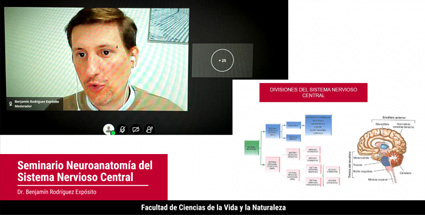
The central nervous system is complex, as it is designed so that there is interaction
Nebrija University professor Benjamín Rodríguez gave two seminars to our students in which he spoke about the anatomical organization of the central nervous system (CNS) and revealed the divisions into which it is organized, its main nuclei and structures, as well as its location.
See article





